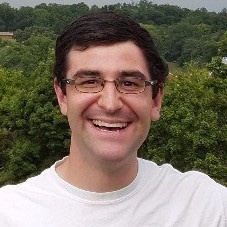LSU CC&E Professor Named NASEM Early-Career Research Fellow
January 24, 2022
 BATON ROUGE—Paul Miller, assistant professor in the LSU College of the Coast & Environment
(CC&E), has been selected for the Early Career Research Fellowship (ECRF), funded
by the National Academy of Sciences, Engineering and Medicine’s Gulf Research Program.
Founded in 2013 in response to the 2010 Deepwater Horizon disaster, the Gulf Research
Program seeks to enhance offshore energy system safety and protect human health and
the environment with $500 million for use over 30 years to fund grants, fellowships,
and other activities in the areas of research and development, education and training,
and monitoring and synthesis.
BATON ROUGE—Paul Miller, assistant professor in the LSU College of the Coast & Environment
(CC&E), has been selected for the Early Career Research Fellowship (ECRF), funded
by the National Academy of Sciences, Engineering and Medicine’s Gulf Research Program.
Founded in 2013 in response to the 2010 Deepwater Horizon disaster, the Gulf Research
Program seeks to enhance offshore energy system safety and protect human health and
the environment with $500 million for use over 30 years to fund grants, fellowships,
and other activities in the areas of research and development, education and training,
and monitoring and synthesis.
Miller is one of six scientists who have been selected for the Offshore Energy Safety track of the National Academy of Sciences’ Early-Career Research Fellowship (ECRF) and the only recipient from Louisiana. Prior CC&E recipients include Cassandra Glaspie (2020), Mike Polito (2020) and Rebeca de Jesús Crespo (2019). As a coastal meteorologist, Miller’s research examines thunderstorms and their associated hazardous weather impacts, focused mostly on the Southeast U.S. and Caribbean.
Established in 2015, the ECRF fellowship awards $76,000 to early-career scientists to pursue bold and novel research that they otherwise might not be able to conduct. During the two-year program, the fellows will pursue projects with the aim of understanding, managing, and reducing systemic risk to offshore energy production and transportation.

Radar image of the thunderstorm that sunk the SEACOR Power (green circle), a lift boat owned by SEACOR Marine that capsized several miles south of Port Fourchon, Louisiana, on April 13, 2021.
– Paul Miller, LSU
To that end, Miller’s recent projects include creating a high-resolution climatological-based forecast of pop-up thunderstorms along the Gulf Coast, an ongoing analysis of the severe weather conditions associated with the April 2021 wreck of the SEACOR Power, and leading the development of a new Gulf of Mexico-centric seasonal hurricane forecast. The latter attracted nationwide media interest shortly after the impact of Hurricane Ida in August 2021. In addition to his research activities, Dr. Miller recently served as the weather scientist and forecaster for “Delta-X”, a large NASA-led field campaign along the Louisiana coast in Spring and Fall 2021.
“This research fellowship will give me valuable flexibility to confront weather-related offshore energy risks. It will allow me to plug into a network of other scientists working on similar problems and foster more collaboration. The opportunity to have these dedicated resources and represent LSU CC&E within a multi-institution team is huge,” Miller said.
Miller’s research provides practical up-to-the-minute forecasting of offshore conditions that are critical for reducing safety risks for offshore oil and gas personnel in a variety of scenarios — including stronger hurricanes and other climate disasters, aging infrastructure, human error, and cybersecurity issues.
View the National Academies of Sciences, Engineering, and Medicines’ press release.
Contact Christine Wendling
LSU College of the Coast & Environment
225-578-4984
christinew@lsu.edu